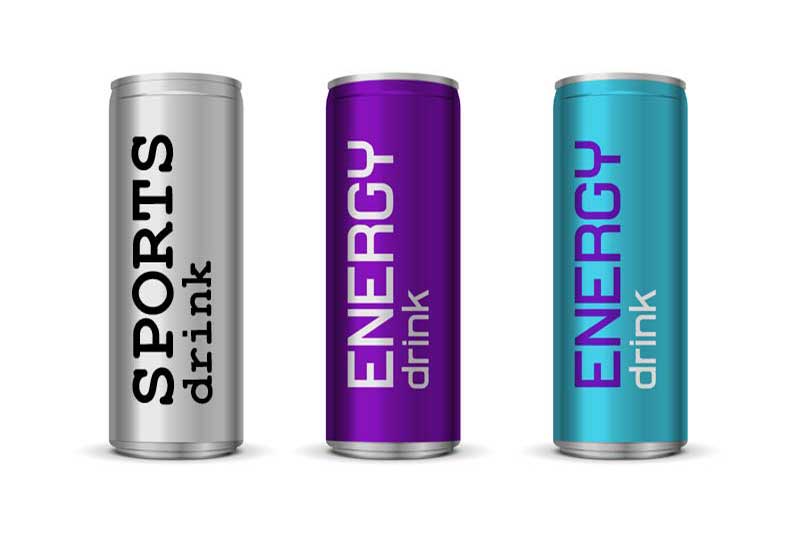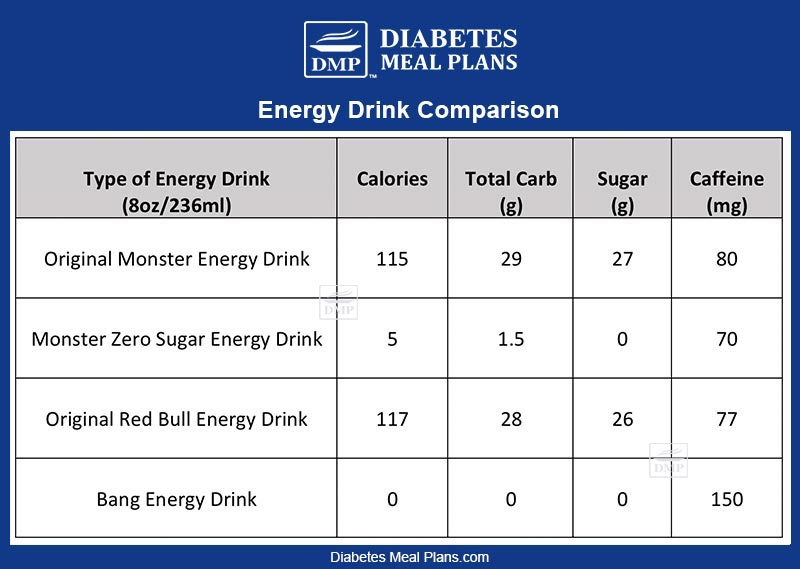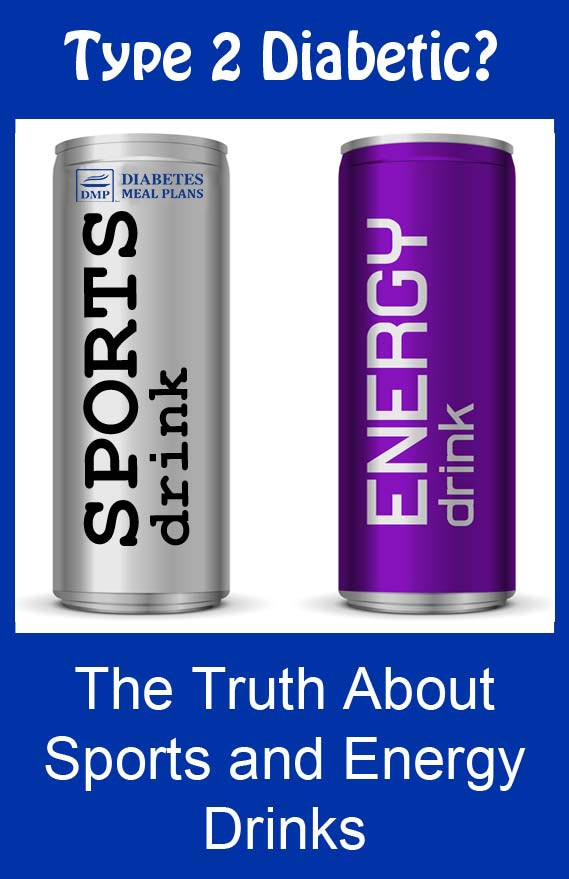People love caffeine, and for good reason—it helps us think clearly, lightens our mood, and even improves our athletic performance.
There some healthy ways to get your daily caffeine “boost” and there are some really unhealthy ways to get it.
Today, we’re going to talk about energy drinks for diabetics, sharing some facts and truths about them.

What Are Energy Drinks Really Made Of?
If you’ve ever taken a glance at the ingredients list on the back of an energy drink and wondered what all those ingredients were, today’s your lucky day. Here’s a quick rundown of the main players found in classic energy drinks:
Caffeine
The average energy drink contains anywhere between 70-150 mg of caffeine per 8 oz serving (236 ml). For comparison, one cup of black coffee contains about 95-100 mg of caffeine and a shot of expresso contains about 65 mg.
In moderate amounts, there is nothing inherently unhealthy about caffeine. It can help with mental clarity and for some, it’s the boost they need to get them up on their feet for a workout or get them through a long day at work.
Caffeine may even have some neuroprotective effects and it may boost metabolism due to naturally occurring antioxidants and anti-inflammatory substances.
The problem comes when you are mixing large doses of caffeine with loads of sugar in the forms of sweetened coffees, sugary sodas, and energy drinks. Many people reach for this combo of caffeine and sugar because they are feeling tired, but much of this tiredness can be overcome by optimizing your sleep, your activity levels, and adhering to a healthy low carb diet.
Once you have these three blood-sugar-regulating factors in check, you may find that you need less caffeine than you used to in order to get through the day!
Sugar
Most energy drinks contain one or more forms of added sugar, ranging from sucrose, to glucose, to high fructose corn syrup. Others contain artificial sweeteners to make the drink taste good (we’ll talk more about this later).
Added sugars like these are the worst of the worst when it comes to both long-term and short-term health effects in type 2 diabetes.
In the short term, you’ll get a large blood sugar spike and you may sufferer elevated blood sugar levels for hours after consuming sugar. This is especially true of sugary beverages that have no proteins, fats, or fiber to slow the absorption of glucose.
In the long term, consuming sugar-sweetened beverages can increase your risk for cardiovascular disease, obesity, elevated HbA1c, and inflammation.
Taurine
Taurine is an amino acid (protein building block) that is naturally occurring and may improve mental performance when combined with caffeine. It is generally considered to be safe in moderate doses.
B-Vitamins
While vitamin B-12 (cobalamin) is known to be the main energy boosting vitamin, many energy drinks contain vitamins beyond B-12. It’s common to see forms of B-2 (riboflavin), B-3 (niacin), B-6 (pyridoxine), and others in addition to vitamin B-12. These B-vitamins work in tandem to give your body and brain an uptick in energy.
Some of these ingredients like B-vitamins can be benign or even beneficial on their own, but all of the added sugars, food dyes, and artificial additives in an energy drink “cancel out” any benefit you would get from these otherwise healthy ingredients.
If you think you are low in vitamins like B-12 (which is common in diabetes), you can raise your levels safely by eating vitamin-rich foods or taking a supplement. But if you think that a sugary energy drink can act as a multivitamin, then think again!
Energy Drinks Nutrition Facts
As far as nutrition facts go, energy drinks are pretty straight forward—there are no fats, proteins, or fiber in sight…just plain sugar.

Keep in mind that the examples above are for 8 oz servings, which is less than a full can of most energy drinks. For example, Red Bull comes in 8, 12, and 16 oz cans while Monster Energy drinks range in size from 16 oz all the way up to a whopping 32 oz can!
If you double or triple the carbs in the table, you’ll be able to see the monumental number of carbs/sugars in a 16 or 32 oz energy drink.
Bang Energy drinks comes in a 16 oz can and, although it contains no real sugar (only artificial sweeteners) a full can contains 300 mg of caffeine, which is equivalent to 3 full cups of coffee.
The takeaway here is to watch out for serving sizes and carefully check the back of any packaged foods or beverages so you know how much sugar you’re actually consuming.

What about Sugar Free Energy Drinks?
Sugarfree energy drinks like Monster Zero Sugar Energy and Bang Energy contain so few carbs because they’re sweetened with artificial sweeteners like sucralose (aka. Splenda) and acesulfame potassium (ACE-K).
Out of all the artificial sweeteners, sucralose has been shown to be among the safest and least toxic. However, that doesn’t mean it will benefit your health in any way!
While considered safe, sucralose has been known to have adverse effects on the health of your gut microbiome, which can have downstream effects on your metabolism and digestion.
A review of multiple studies concluded that artificially sweetened beverages were not a healthier alternative to sugar-sweetened beverages in terms of blood sugar stability or obesity risk.
In fact, research has shown that regularly consuming artificial sweeteners increases your risk of obesity, metabolic syndrome, blood sugar dysregulation, and cardiovascular disease.
Healthy Energy Drink Alternatives
If you love your morning or afternoon kick of caffeine, you don’t have to settle for a sugar-laden energy drink any longer.
Here are some sugarless caffeine options for you to try out:
- Coffee (use liquid stevia or erythritol for a little sweetness)
- Green or black tea
- Stevia or monk fruit-sweetened sodas
- Stevia-sweetened energy drinks like Zevia

Leave a Reply